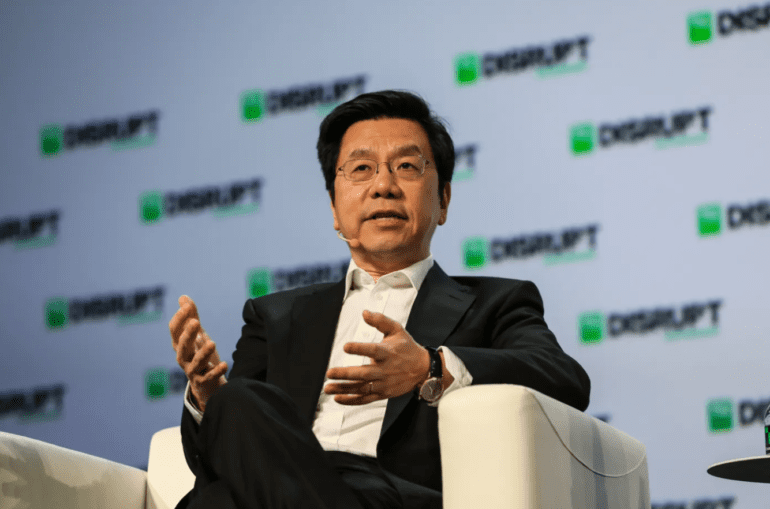TL;DR:
- Kai-Fu Lee’s 01.AI unveils open-source LLM model, valued at $1 billion.
- 01.AI aims to fill the gap left by inaccessible OpenAI and Google products in China.
- Yi-34B, a bilingual LLM model, outperforms larger models in pre-trained rankings.
- Successful fundraising has allowed 01.AI to assemble a top-tier team.
- The monetization strategy includes open-sourcing some models and creating proprietary ones.
- Strategic GPU stockpiling mitigates the impact of potential U.S. sanctions.
- 01.AI explores application development in productivity and social domains.
- The ultimate goal is to create an ecosystem for developers to build applications easily.
Main AI News:
In the dynamic landscape of artificial intelligence, where innovation is a constant driving force, Kai-Fu Lee, renowned computer scientist and author of the bestseller “AI Superpowers,” has embarked on a new venture with grand ambitions. In March, Lee introduced 01.AI, a company dedicated to developing a homegrown large language model tailored for the Chinese market. This bold move places him in competition with other influential tech leaders in China, such as Sogou’s founder, Wang Xiaochuan, who are actively assembling talent and securing venture capital to create China’s equivalents of OpenAI.
Lee, the 61-year-old CEO of 01.AI, shared his motivation for founding the company, stating, “I think necessity is the mother of innovation, and there’s clearly a huge necessity in China. Unlike the rest of the world, China doesn’t have access to OpenAI and Google because those two companies did not make their products available in China, so I think many doing LLM are trying to do their part in creating a solution for a market that really needs this.”
The rapid growth of 01.AI mirrors the fast-paced development in the generative AI field. Within just seven months of its inception, the startup unveiled its debut product, the open-source Yi-34B model. This strategic decision to introduce an open LLM reflects Lee’s commitment to giving back to society. He emphasized that for those who consider LLaMA a “godsend,” 01.AI offers a compelling alternative.
Yi-34B, a bilingual (English and Chinese) base model with 34 billion parameters, has emerged as a frontrunner among pre-trained LLM models, surpassing larger models like Falcon-180B and Meta LlaMa2-70B, according to a ranking by Hugging Face. Lee expressed his confidence in the potential of even larger models, stating, “We still believe that larger models, when trained well, on a large amount of high-quality data, will always outperform substantially smaller models of comparable quality and comparable technology, so I think [Yi-34B] outperforming much larger models is something that we don’t usually see.“
The startup’s ability to rapidly commence model training is a testament to its successful fundraising efforts, a crucial factor in attracting top-tier talent and AI processors. While specific fundraising figures remain undisclosed, 01.AI has achieved a valuation of $1 billion with support from investors like Sinovation Ventures and Alibaba Cloud, among others.
With a workforce exceeding 100 employees, over half of whom are LLM experts from major multinational and Chinese tech firms, 01.AI boasts a formidable team. The key figures behind Yi-34B, Wenhao Huang and Ethan Dai, bring extensive experience from Microsoft Research Asia, Huawei, and Alibaba.
Kai-Fu Lee’s extensive background, including the founding of Microsoft Research Asia and his role in spearheading Google China, has earned him a reputation as one of China’s most well-connected investors and entrepreneurs. He stressed the importance of attracting exceptional talent, saying, “Now, of course, you want to pay people fairly, and you need to be competitive in pay, but I really think that it’s also about people believing they can make a difference and believing the company can succeed.”
The startup acknowledges that building LLMs is a costly endeavor. To sustain its cash-intensive operations, 01.AI has devised monetization strategies from the outset. While some models will continue to be open-sourced, the primary objective is to create a cutting-edge proprietary model that serves as a foundation for a diverse range of commercial products. Lee emphasized, “We can’t open-source everything…When we raise a lot of money, most of it will be spent on the GPU. Given that, we needed to first acquire as much GPU as we could, which we did.”
In anticipation of potential U.S. sanctions, 01.AI proactively stockpiled GPUs, even before securing funding. This strategic move proved prescient, as it now ensures a sufficient supply for the next 12-18 months. U.S. sanctions have also prompted Chinese firms to optimize computing power, further encouraging innovation. “With a very high-quality infrastructure team, for every 1,000 GPUs, we might be able to squeeze 2,000 GPUs workload out of them,” Lee noted.
01.AI’s path to monetization hinges on its ability to find product-market fit for its high-cost AI models. While elite LLM scientists are scarce, China’s robust mobile internet ecosystem positions it favorably for creating superior applications. Although specific services remain undisclosed, Lee hinted at ventures in productivity and social domains, with an aim to release an app within the calendar year.
Ultimately, 01.AI aspires to become an ecosystem that empowers external developers to create applications effortlessly. Lee emphasized, “The duty is not just to push out good research models, but even more importantly to make application development easy so that there can be compelling applications.” The success of Lee’s AI endeavor will be revealed in time, as it seeks to shape the future of AI in China and beyond.
Conclusion:
Kai-Fu Lee’s 01.AI is making significant strides in the AI market by introducing an open-source LLM model tailored for the Chinese market. With a valuation of $1 billion, successful fundraising, and a strong team, 01.AI is well-positioned to address the gap in China’s access to AI technology. Its focus on monetization and GPU stockpiling reflects strategic thinking in a rapidly evolving landscape. As 01.AI explores application development and ecosystem-building, it has the potential to reshape the AI landscape in China and foster innovation in the field.

